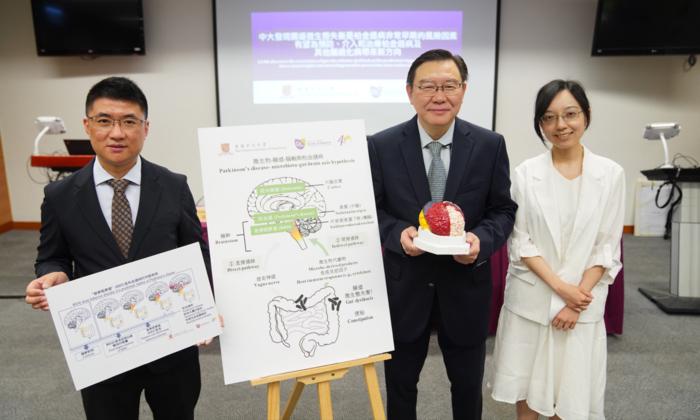Rapid eye movement sleep behavior disorder (RBD), also known as dream-enacting behavior, is a common symptom during the prodromal stage of Parkinson’s disease.
In 2019, the Department of Psychiatry at CUHK conducted the world’s first RBD family study, which confirmed that relatives of RBD patients who are directly related to them have a three to six times higher chance of developing RBD, Parkinson’s disease, and other neurodegenerative disorders compared to the general population. Relatives of RBD patients also exhibit a significantly higher prevalence of constipation.
CUHK’s Department of Psychiatry collaborated with multiple departments and the Center for Gut Microbiota Research, as well as the Center of Parkinsonism and Movement Disorders at the Paracelsus-Elena Hospital in Kassel, Germany, recruiting a total of 441 participants, including healthy individuals, relatives of RBD patients, RBD patients, and early-stage Parkinson’s disease patients.
The results revealed that both RBD patients and their relatives exhibit gut microbiome dysbiosis similar to those seen in Parkinson’s disease patients. This primarily involves the depletion of health-promoting bacteria, such as Faecalibacterium and Roseburia, and an increase in bacteria associated with inflammation and the disruption of intestinal barrier function.
Professor Huang Bei, Research Assistant Professor of CU Medicine’s Department of Psychiatry, highlighted that changes in gut bacteria can affect both intestinal and brain health. In Parkinson’s disease patients, the integrity of the intestinal barrier is compromised, allowing certain microbial metabolites and pro-inflammatory factors to more easily enter the neural system of the gut, triggering abnormal aggregation of synuclein (a neuronal protein) in the enteric and central nervous systems, subsequently leading to neurodegeneration. This suggests that gut microbiota imbalance may be crucial in developing Parkinson’s disease.
Further analysis by the research team identified 12 microbial markers that can effectively differentiate RBD patients from healthy individuals. In the future, machine learning models could be used for screening purposes to identify specific gut microbial characteristics and identify individuals at risk of RBD and the prodromal stage of Parkinson’s disease, enabling early intervention to reduce their chances of developing Parkinson’s.
Professor Wing Yun-kwok, Chairman of CU Medicine’s Department of Psychiatry, stated that adjusting gut microbiota, for example, through probiotics and prebiotics, could potentially offer early intervention, prevention, and treatment for Parkinson’s and other neurodegenerative diseases.
The study’s findings suggest that gut microbiota imbalance is an early risk factor for Parkinson’s disease. By examining gut microbiota, it may be possible to identify high-risk cases and provide early intervention, prevention, and treatment for Parkinson’s and other neurodegenerative diseases.
Parkinson’s disease is the second most common neurodegenerative disorder globally. “Rapid eye movement sleep behavior disorder” (RBD) is a common prodromal symptom of Parkinson’s disease.
To understand the relationship between the “microbiota-gut-brain axis” and the pathogenesis of Parkinson’s disease, the CUHK Faculty of Medicine collaborated with a German hospital to recruit over 400 participants for a study.
The results revealed that individuals with RBD and their direct relatives exhibited similar gut microbiota imbalances to those observed in Parkinson’s patients.
This imbalance included a reduction in bacteria that promote health and an increase in bacteria that promote inflammation and disrupt the gut barrier function.
The study suggested that changes in gut bacteria could facilitate the entry of certain metabolites and pro-inflammatory factors into the neural system of the gut, leading to neuronal cell death.
After further analysis, the research team identified 12 microbial markers that effectively distinguished RBD patients from healthy individuals.
This finding raises the possibility of identifying specific gut microbiota features to detect individuals with RBD and those in the prodromal stage of Parkinson’s disease.
The team also noted that adjusting gut microbiota through probiotics and prebiotics could offer opportunities for early intervention, prevention, and treatment of Parkinson’s and other neurodegenerative diseases.




